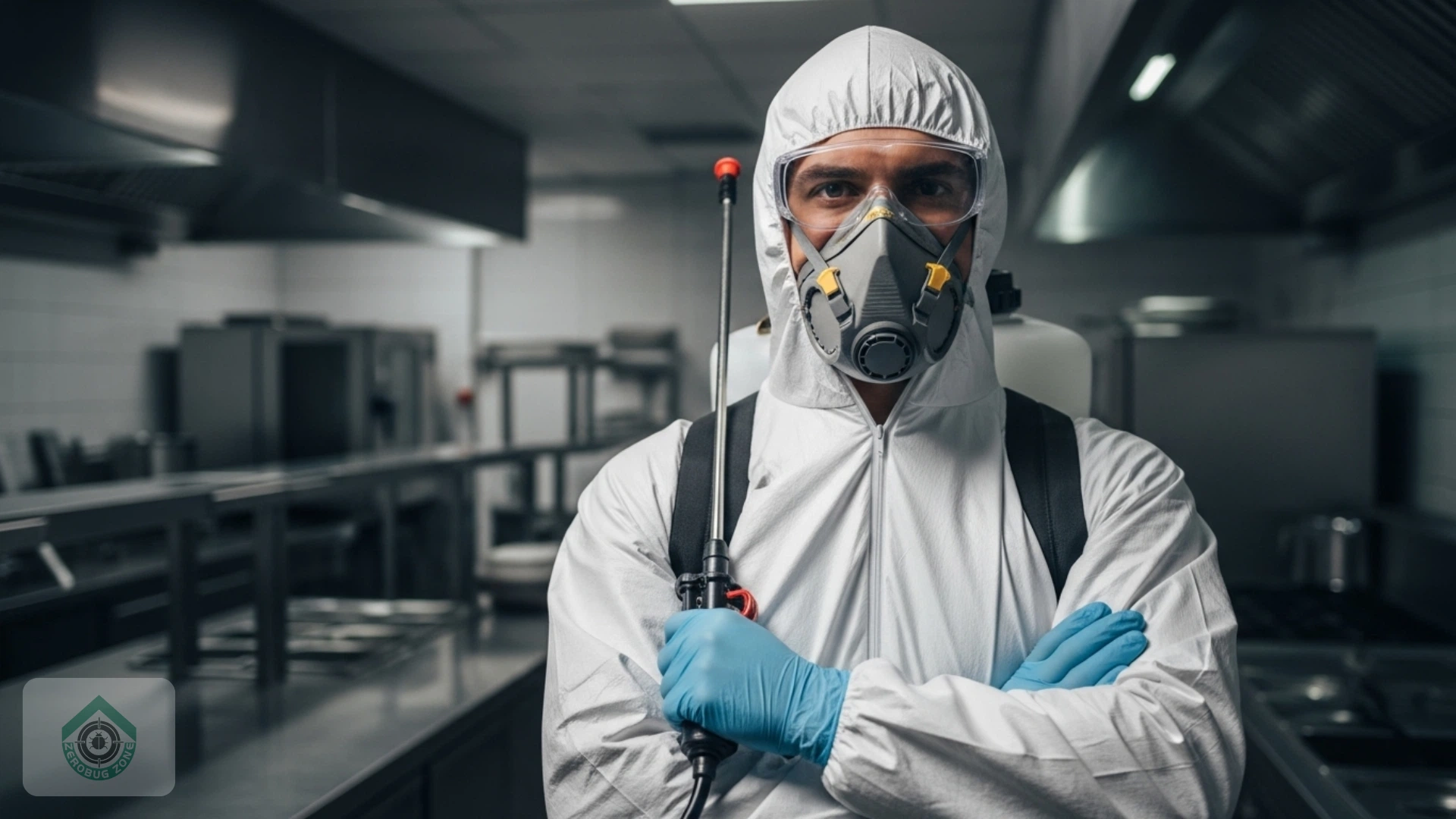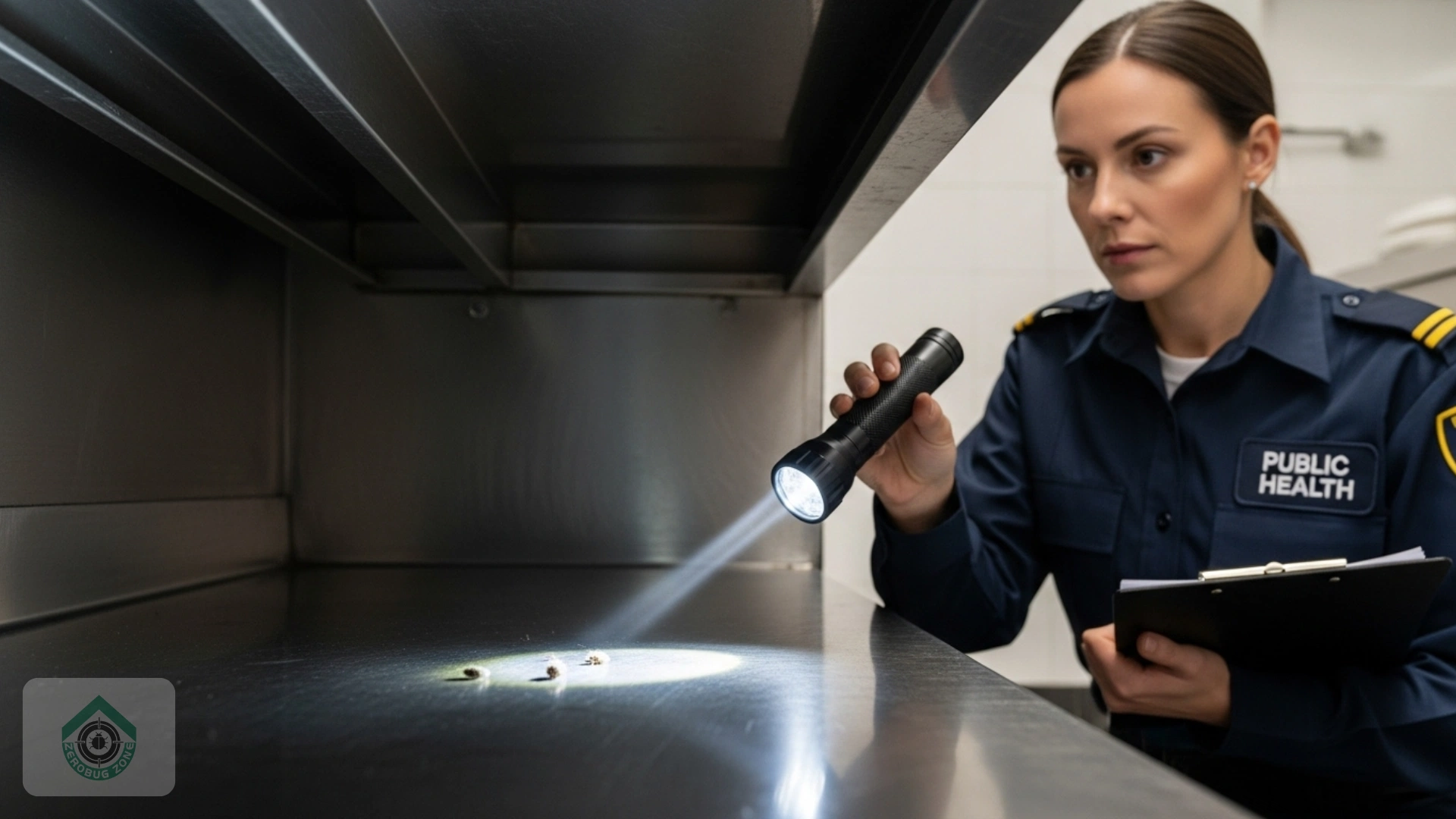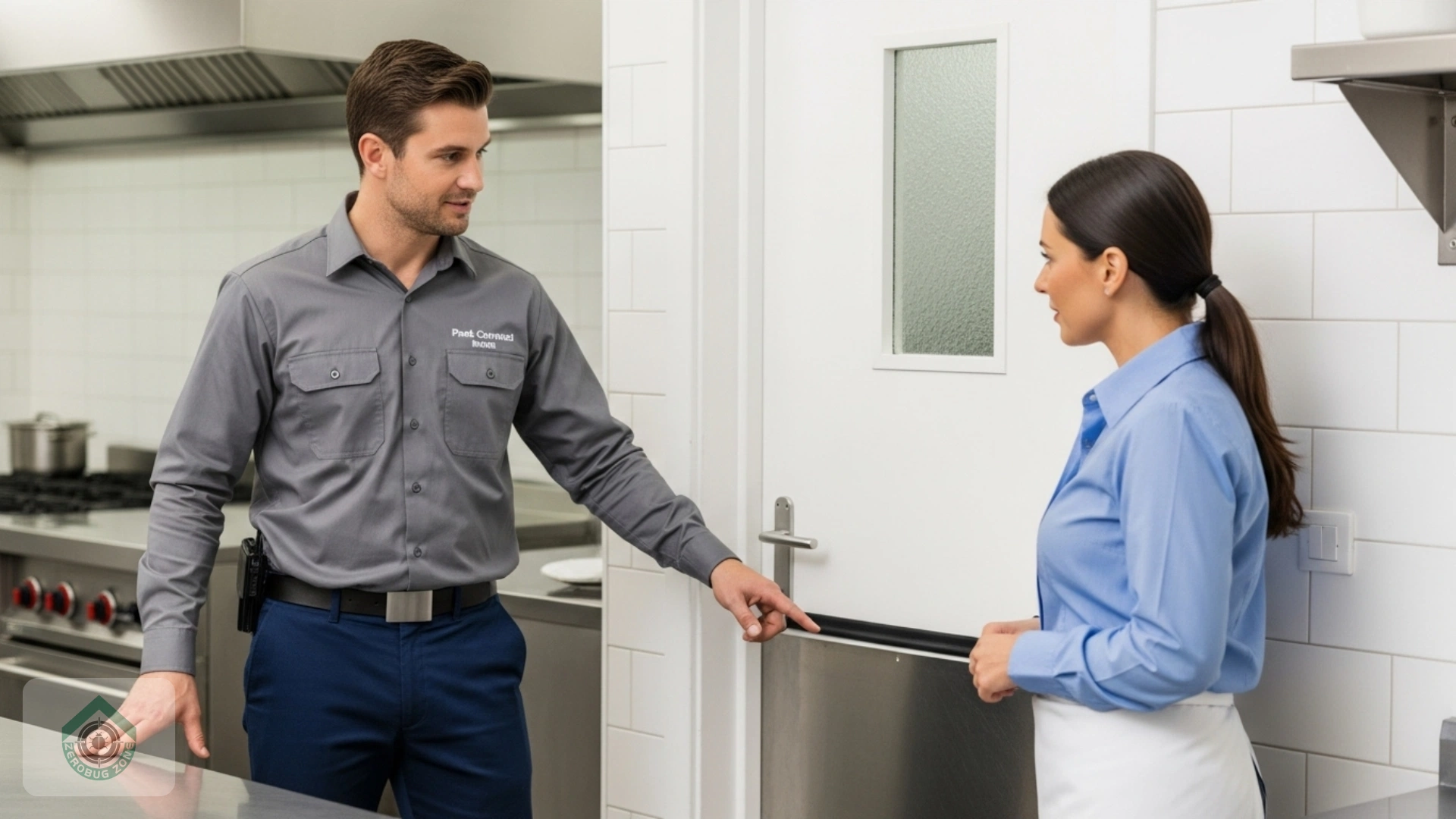Pest Control for Restaurants in Brampton: What Canadian Health Inspectors Look For

Let's cut to the chase. If you're running a restaurant in Brampton, you know the food scene is tough. Your reputation? It's not just part of the business. It's everything. You've poured your heart and soul into building it on amazing food, great service, and a vibe that keeps people coming back.
Every perfect plate, every 5-star review, every regular face... that's your story.
And it can all come crashing down in a second. All it takes is one tiny pest. A single cockroach zipping across the floor isn't just gross. It's a direct blow to the trust you've built and a real threat to your livelihood.
So, you have to get serious about pest control. This isn't just another chore on your list. It's a core part of protecting your brand and keeping your customers safe. Proactive pest management isn't a cost—it's an investment. It’s the invisible force field around your business. Let’s break down what Peel Public Health inspectors are actually looking for.
Why Pest Control is a Critical Ingredient for Your Restaurant's Success
So what happens if you fail a health inspection over pests? It's not a slap on the wrist. The fallout can hit every corner of your business, and it hits hard. First, there are the fines, which can be huge. In the worst cases, they can even shut you down temporarily. That means zero revenue coming in.
But the real damage often comes later. We live online now. Health inspection results are public, and people know how to find them. One bad report about pests can spread like wildfire on social media. Suddenly, you have a PR crisis that’s incredibly difficult to fix. Every person who reads that and decides to go elsewhere is money walking out the door.
This is why you have to think of pest control as risk management. A solid plan isn't just about killing bugs; it's an investment in your brand. It tells your customers you care about cleanliness. In a city packed with amazing food options like Brampton, that trust can be your biggest advantage.
When you're proactive, you're not just stopping pests. You're guarding the reputation you've bled for. You're making sure people talk about your incredible food, not a health code violation. At the end of the day, that's what it's all about.

The Health Inspector's Checklist: Top Pest-Related Red Flags
That moment a Peel Public Health inspector walks through your door? It's not a friendly chat. They're a pro, and they're on a mission to find anything that could be a health risk. And you can bet pests are at the very top of their list.
Inspectors are trained to think like pests. They know where they hide. If they spot one, they assume there are hundreds more you can't see. That's why they look for more than just live bugs. They're hunting for the tiny clues and bad habits that allow pests to thrive.
Think of it like a three-point inspection. First, they're looking for hard evidence—the smoking gun. Second, they'll check your building for entry points. And third, they'll scrutinize your daily routines. Get these three things right, and you'll pass.
Finding Direct Evidence: Live Pests and Their Traces
This is where things get real. Finding actual proof of pests is the fastest way to fail. A live bug is a huge problem, but an inspector's search is way more detailed than that.
They’re looking for the little things. The greasy trails rodents leave on walls. The tiny, black-pepper-like droppings from cockroaches. Even the shed skins insects leave behind. To an inspector, any of these is an open-and-shut case.
Cockroaches, Rodents, and Flies: The "Critical Infraction" Pests
Not all pests are created equal in an inspector's eyes. Some are what they call "critical infractions." This is the worst category. Who's on this list? Cockroaches, rodents, and flies.
Why? Because these three are notorious for spreading diseases. They carry nasty bacteria like Salmonella and E. coli right into your kitchen. Finding any of these isn't just a fine—it's a major public health emergency.

What Inspectors Look For: Droppings, Gnaw Marks, and Nests
An inspector's search is like a forensic investigation. With a good flashlight, they will hit all the dark, warm, and hidden spots in your restaurant. The exact places pests call home.
They'll get down and look under your heavy equipment. They'll check the back of storage shelves and inside motors. They’re hunting for chew marks on wires and packaging. They're looking for nests made of shredded paper. No stone is left unturned.
Assessing Your Defenses: Structural Issues and Entry Points
A smart inspector knows something important: pests had to get in somehow. So, they’ll examine your building's defenses. They look at your restaurant like a castle that's under siege.
They know you could be the cleanest restaurant in the world, but if you have holes in your walls, pests will find them. This part of the inspection is all about prevention. It's about finding weaknesses before the pests do.
Gaps in Doors, Walls, and Foundations
You would be shocked at how small of a gap a pest needs. A mouse can slip through a hole the size of a dime. A cockroach can flatten itself and slide under a door. That's why inspectors are obsessed with seals.
They'll check the rubber sweeps on your doors. They'll look for gaps around pipes where they enter the building. Any crack in the foundation, no matter how small, is a giant "welcome" sign to pests that an inspector will absolutely flag.
Unscreened Vents and Windows
Any opening to the outside is a potential highway for pests. The inspector will check every single one. That includes windows that open and all your ventilation systems. Kitchen exhaust vents are a huge one, since they pump out delicious food smells all day long.
They will make sure every vent is covered with a tough, well-maintained screen. No rips, no holes. An unscreened vent is a glaring mistake. It’s like putting out a welcome mat and leaving the front door wide open.
Examining Your Operations: Sanitation and Storage Protocols
Okay, so your building is sealed tight. That's only half the job. Your daily routines are what will make pests either stay or leave. An inspector will watch your procedures for cleaning, storage, and trash like a hawk.
These habits determine if pests have access to food, water, and a place to hide. Bad habits can turn your restaurant into a pest paradise, giving them everything they need to start a family.
Improper Waste Management
Your dumpster area is a giant, flashing neon sign for pests. An inspector will look at your whole trash process. Inside, they’ll check that your bins are lined and have lids that actually fit.
Then, they'll head outside. That dumpster area can be ground zero. They'll make sure the lids are always closed and the ground around it is clean. Spills and overflowing trash are a free buffet for every pest in the neighborhood.
Food Storage and Contamination Risks
How you store your food tells an inspector everything they need to know. They will go through your dry storage to make sure it's pest-proof.
The number one rule? Everything in sealed, hard containers. No paper bags or cardboard boxes. Rodents will chew right through those. They'll also check that everything is at least six inches off the floor and away from the walls. This makes it harder for pests and way easier to clean.
Standing Water and Grease Buildup
Pests need water. A leaky pipe or a clogged floor drain is like a drinking fountain for them. An inspector will hunt for any source of moisture. Even the drip tray in your fridge can be a problem if it's not emptied.
And then there's grease. That sticky gunk behind your cooking line? It’s a superfood for cockroaches. An inspector will check these spots. A lot of grease buildup is a dead giveaway that deep-cleaning isn't a priority.
Reviewing Your Records: The Importance of Documentation
After the physical tour, the inspector will probably say, "Let me see your logbook." In their world, if it's not written down, it never happened. Keeping a detailed pest control logbook isn't just about paperwork.
It's your proof. It shows the inspector you're on top of things. It shows you have a professional system in place. This instantly builds trust and shows them you're taking food safety seriously.
Proof of a Professional Pest Management Program
Showing the inspector a logbook from a certified pest control company is a power move. It tells them right away that you've hired experts who are regularly checking your restaurant.
To an inspector, this is a huge green flag. It means a trained professional has eyes on your property. This drastically lowers the chances of a small problem becoming a disaster. It shows you're a responsible operator.
Up-to-Date Logbooks and Service Reports
A good logbook tells the whole story. The inspector will want to see service reports from every visit. These reports need to show what was checked, what was found, and what was done about it.
They should also list any recommendations the technician made, like fixing a leaky pipe. A complete file with maps and records gives a clear, transparent picture of your commitment to being pest-free.

How to Implement an Inspection-Proof Pest Management Strategy
To really nail your health inspection, you need to change your mindset. You have to stop reacting to pests and start proactively preventing them. The best way to do this is with a strategy called Integrated Pest Management (IPM).
IPM is the gold standard. It's a smart approach that health departments love because it focuses on the root causes of pest problems. It's all about building long-term solutions and using chemicals as a last resort, not a first step.
An effective IPM program isn't a one-time fix. It’s a team effort between you, your staff, and your pest control pros. It's about combining knowledge of your specific restaurant with knowledge of how pests think. This teamwork creates a fortress that’s always ready for inspection.
Step 1: Partner with a Certified Pest Control Expert in Brampton
Your first and most important step is to pick the right partner. Not just any pest control company will do. You need someone who specializes in commercial kitchens, specifically in Brampton.
They'll know the local pests and the Peel Public Health rulebook inside and out. Find a company that's all about IPM and partnership, not just showing up to spray.
Step 2: Develop a Proactive Integrated Pest Management (IPM) Plan
Once you have a partner, you’ll build a custom IPM plan. It starts with a deep Inspection to find your weak spots. Then comes ongoing monitoring to catch problems early.
A key part is correctly identifying any pests, because you can't fight an enemy you don't know. The heart of the plan is Sanitation and Exclusion—top-notch cleaning and sealing up entry points. Treatment only happens when absolutely necessary.
Step 3: Train Your Staff to Be the First Line of Defense
Your pest technician is great, but they're not there every day. Your staff is. They are your eyes and ears on the ground, and they are your secret weapon against pests. IPM is a team sport.
You have to train your staff to be part of the solution. Teach them what to look for. Help them understand that their daily cleaning is actually a powerful pest control tool. Make it easy for them to report anything suspicious so you can act fast.

Don't Let Pests Threaten Your Brampton Restaurant's Reputation
In Brampton's fast-moving restaurant scene, your reputation is everything. You have to protect it with the same care you give to your menu or your staff. A pest infestation is one of the most direct threats to that reputation.
It can undo years of hard work in the time it takes for a photo to go online. Passing your health inspection isn't just about avoiding a fine; it's about keeping your promise of a safe and wonderful dining experience. It's fundamental to your brand's integrity.
Embracing a proactive pest management strategy is one of the smartest decisions you can make for your business. By shifting from reaction to prevention and partnering with a certified commercial pest control expert, you are investing in peace of mind. You are building a resilient operation that is prepared for scrutiny at all times. Don't wait for the sight of a pest or the arrival of an inspector to take action. Take control of your environment, protect your hard-earned reputation, and ensure your Brampton restaurant continues to be known for all the right reasons.

